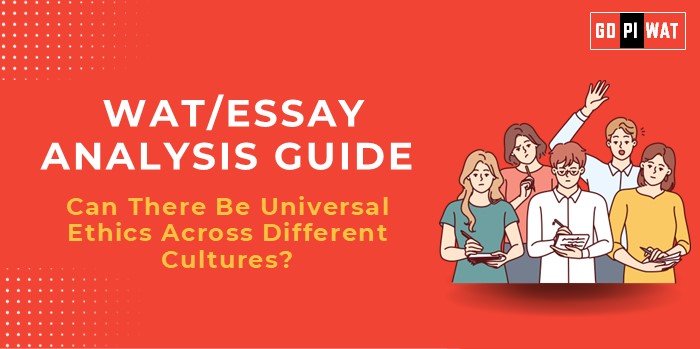📋 Written Ability Test (WAT)/Essay Analysis Guide: Can There Be Universal Ethics Across Different Cultures?
🌐 Understanding the Topic’s Importance
This essay probes the tension between cultural diversity and global ethical standards. It’s critical for future leaders to navigate this dichotomy, especially in multinational roles.
📝 Effective Planning and Writing
- ⏱️ Time Allocation:
- Planning: 5 minutes
- Writing: 20 minutes
- Review: 5 minutes
- 📚 Preparation Tips:
- Note key examples like the UDHR and climate action.
- List stakeholders such as global organizations and cultural groups.
💡 Introduction Techniques for Essays
- 🔀 Contrast Approach: “While universal ethics aim for global justice, cultural traditions often resist such impositions, creating a clash of ideals.”
- 🔧 Solution-Based Approach: “Can ethical frameworks address both global crises and cultural uniqueness? Universal ethics attempt to bridge this gap.”
📂 Structuring the Essay Body
- ✨ Achievements:
- Highlight global consensus on human rights.
- Cite vaccine equity and ethical AI advancements.
- ⚠️ Challenges with Comparative Analysis:
- Discuss cultural relativism using Middle Eastern vs. Western ethical views.
- Present the Paris Climate Agreement as a test of universal ethics.
- 🌅 Future Outlook: Suggest adaptive universal ethics accommodating cultural contexts.
📄 Concluding Effectively
- ⚖️ Balanced Perspective: “Universal ethics serve as a guiding star, but their success lies in harmonizing global and local values.”
- 🌍 Global Comparison: “As seen in Japan’s harmony ethics and Nordic inclusiveness, the pathway to universal ethics lies in mutual respect.”
🔍 Analyzing Successes and Shortcomings
- 💪 Key Achievements: Global human rights frameworks; ethical AI policies.
- ⚡ Ongoing Challenges: Cultural bias in ethics; enforcement gaps.
- 🌎 Global Context: Compare Rwanda’s reconciliation ethics with the UDHR’s global stance.
✅ Recommendations for Sustainable Progress
- 🌐 Facilitate intercultural dialogues: Promote understanding and collaboration across cultures.
- 📖 Enhance ethical education globally: Build awareness of universal principles among diverse populations.
- ⚙️ Establish flexible frameworks: Adapt global standards to respect local contexts and traditions.
✍️ Sample Short Essays
- ⚖️ Balanced Perspective: “Universal ethics offer a framework to address global issues. However, respecting cultural nuances is vital to their acceptance.”
- 💡 Solution-Oriented: “Universal ethics must evolve through dialogue, bridging cultural values with global principles.”
- 🌍 Global Comparison: “Drawing lessons from diverse ethical models, universal standards can adapt to foster inclusivity and fairness.”


